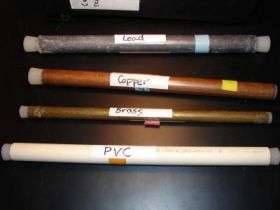Plumbing systems with polyvinyl chloride plastic pipes could be more susceptible than copper pipes to leaching of lead and copper into drinking water, researchers report. Credit: Courtesy of Marc Edwards
Scientists in Virginia are reporting that home plumbing systems constructed with polyvinyl chloride (PVC) plastic pipes may be more susceptible to leaching of lead and copper into drinking water than other types of piping -- especially when PVC systems include brass fixtures and pipefittings. The study is scheduled for the June 15 issue of ACS’ Environmental Science & Technology.
Marc Edwards and colleagues point out that more water purification plants in the United States are using chloramine to treat water. At the same time, builders are plumbing more houses with plastic pipe, rather than copper, to cut costs.
Past studies have found that ammonia formed in chloramine-treated water can trigger a series of events that corrode brass faucet components and connectors commonly used in PVC plumbing systems. Corrosion of brass (made with copper, zinc and lead) releases those metals into water pipes and makes faucets prone to failure.
In the new study, researchers sampled water from polyvinyl chloride (PVC), copper, lead, and other pipe material under a range of experimental conditions. They found that corrosive conditions were often worst in plastic pipes, which could be expected to cause higher metal leaching of zinc and lead from brass faucets used in homes and buildings.
Article: dx.doi.org/10.1021/es702483d
Source: ACS
























